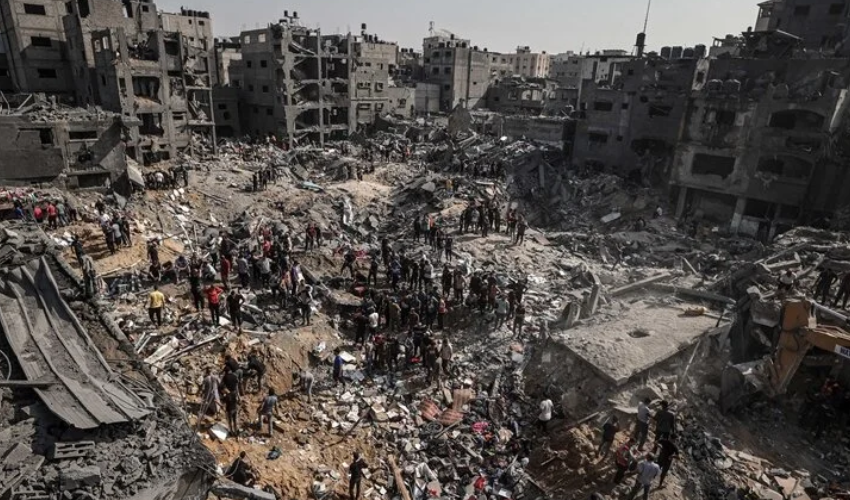Is United Nations complicit in Israel’s strategy in Gaza?
Türkiye Today examines whether the United Nations’ actions in Gaza assist in Israel’s strategy, amid serious claims of organ theft by Israeli forces
EXCLUSIVE BY KEVSER ERBAY — As the conflict in Gaza grows increasingly deadly each day, I rummaged through the archives.
My investigation into this matter began with a revisit to a report I wrote a few months ago, citing The Guardian, about allegations of Israelis harvesting organs from Palestinians (click here to read).
This report, accompanied by striking images, led me to discover additional accounts on various websites about the trafficking of Palestinian organs in Israel.
Further exploration into the archives revealed a significant story by Osman Sagirli, a journalist with 30 years of experience at ‘Türkiye Gazetesi’ from 2011. Sagirli reported on the theft of organs from Somali children, allegedly occurring under the U.N.’s watch (click here to read). This revelation raises questions about the efficacy and objectives of the U.N.’s interventions in conflict zones.

The United Nations Relief and Works Agency (UNRWA) has established several camps, gathering thousands of children and women. These camps have been targeted by Israel numerous times, raising questions about the underlying intentions behind these actions. The documented instances of these camps being hit raise concerns over their safety and the broader implications for those seeking refuge.
The timeline of attacks on United Nations camps in the Gaza Strip, as per official records, includes:
- Al-Shati Refugee Camp: Hit on multiple dates including Oct. 9, Oct. 12, Jan. 29, March 6, Feb. 24, and March 22.
- Cebaliye Refugee Camp: Targeted from Oct. 9 to 22, and again on Oct. 31 and Nov. 1–2.
- Al-Fakhoora School: Attacked from Nov. 13 to 23 and Dec. 5-6.
- Al-Bureij Refugee Camp: Strikes occurred on Oct. 17, Nov. 5, Dec. 22, Dec.23, March 1 and March 14.
- Al-Maghazi Refugee Camp: Faced attacks on Oct. 17, Nov. 5, Dec. 6, Dec. 24 and 25, Dec.28 and Jan. 9.
- Nuseirat Refugee Camp: Suffered attacks on a series of dates ranging from Oct. 18 to March 21.
- Shaboura Refugee Camp: Hit on Dec. 7 and Dec. 14.
Given the frequency and pattern of these strikes, the question arises: Is the United Nations inadvertently or intentionally playing a role in the broader strategy of the conflict in Gaza?
Amid the escalating conflict between Israel and Hamas, UNRWA has emerged as the primary source of food, water and shelter for Gaza’s civilians.
Euro-Med Monitor reports alleged organ theft by Israel in Gaza: Medical claims under scrutiny
The Euro-Med Human Rights Monitor has raised alarms over alleged organ theft by Israeli forces from deceased Palestinians. According to the nongovernment organization (NGO), medical professionals in Gaza have reported missing vital organs, such as livers, kidneys, and hearts, as well as cochleas and corneas from some bodies released by Israel.
These findings have been presented as evidence of potential organ theft, a claim further supported by documented instances of Israeli forces confiscating bodies from hospitals in northern and southern Gaza.
Additionally, it has been reported that Israel exhumed and took bodies from a mass grave located within al-Shifa’s courtyard.
While the Israel Defense Force has been asked to comment, Israel has historically refuted claims of harvesting organs from Palestinians without familial consent, labeling such allegations as “antisemitic.”
The feasibility of conclusively proving or disproving organ theft through forensic medical examination is complicated, as noted by doctors in Gaza because many of the bodies had undergone surgical procedures prior to death. The ongoing intensity of Israeli assaults on Gaza has further hampered comprehensive examinations of the recovered corpses.
This situation is exacerbated by statements from Palestinian health officials in Gaza regarding the collapse of the enclave’s health system, making it impossible to account for the deceased accurately.



